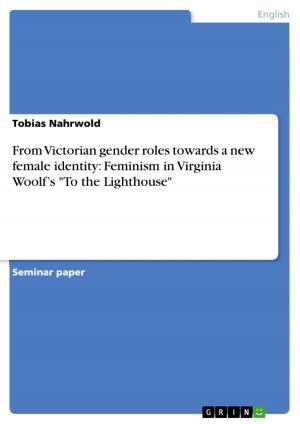The Roaring Twenties - Historical Circumstances of 'The Great Gatsby'
Nonfiction, Entertainment, Drama, Anthologies| Author: | Toni Friedrich | ISBN: | 9783656093862 |
| Publisher: | GRIN Verlag | Publication: | January 3, 2012 |
| Imprint: | GRIN Verlag | Language: | English |
| Author: | Toni Friedrich |
| ISBN: | 9783656093862 |
| Publisher: | GRIN Verlag |
| Publication: | January 3, 2012 |
| Imprint: | GRIN Verlag |
| Language: | English |
Seminar paper from the year 2007 in the subject American Studies - Literature, grade: 2,0, Martin Luther University, language: English, abstract: 'The Lost Generation' is a term which encompasses a broad range of American authors who were born around 1900. Amongst those litterateurs are many who are said to be among the most influential and important writers in the history of American letters. This term paper shall examine what historical circumstances constituted the 'common adventures' and 'common attitudes' of that generation as reflected in Fitzgerald's novel The Great Gatsby. The term 'The Lost Generation' was given by Gertrude Stein, an authoress of note and contemporary of both Fitzgerald and Hemingway, who used her quotation: 'you are all a lost generation,' as the epigraph for his novel The Sun Also Rises. What is meant by the attribute 'lost'? Why was this dismal term applied to the young adults of the 1920s - an era of prosperity and freedom in America? How did Fitzgerald depict this 'lost' world in The Great Gatsby, with respect to material abundance on the one hand versus spiritual poverty on the other? The zeitgeist of an era inevitably shapes the human beings who live in it: how they act, what they look like, and what they think the meaning of their lives in particular and humanity in general might be. Therefore, it is necessary to explore the 1920s in America in order to understand fully the meaning Fitzgerald communicates in The Great Gatsby. This paper will therefore investigate several characteristics of the decade which are relevant for the interpretation of the novel. The parameters to be surveyed are: society in general; the materialism, wealth and industrialization which created that society; Prohibition as one of the most significant elements of the 20s; the faltering faith in God (as but one example of the failure of institutions that were supposed to be a refuge for human beings); and the loss of faith in the American dream and other treasured ideals. These issues will be analyzed in consideration of The Great Gatsby and the question of how Fitzgerald uses them as tropes for his social criticism of the so called Jazz Age. The paper will be based on a number of monographs and anthologies dealing with the major American writers and literature of the 1920s as well as the historical context that shaped their literary vision. The particular focus will be on Fitzgerald's seminal novel, The Great Gatsby, as it incorporates and inflects the major historical and literary themes of its time.
Seminar paper from the year 2007 in the subject American Studies - Literature, grade: 2,0, Martin Luther University, language: English, abstract: 'The Lost Generation' is a term which encompasses a broad range of American authors who were born around 1900. Amongst those litterateurs are many who are said to be among the most influential and important writers in the history of American letters. This term paper shall examine what historical circumstances constituted the 'common adventures' and 'common attitudes' of that generation as reflected in Fitzgerald's novel The Great Gatsby. The term 'The Lost Generation' was given by Gertrude Stein, an authoress of note and contemporary of both Fitzgerald and Hemingway, who used her quotation: 'you are all a lost generation,' as the epigraph for his novel The Sun Also Rises. What is meant by the attribute 'lost'? Why was this dismal term applied to the young adults of the 1920s - an era of prosperity and freedom in America? How did Fitzgerald depict this 'lost' world in The Great Gatsby, with respect to material abundance on the one hand versus spiritual poverty on the other? The zeitgeist of an era inevitably shapes the human beings who live in it: how they act, what they look like, and what they think the meaning of their lives in particular and humanity in general might be. Therefore, it is necessary to explore the 1920s in America in order to understand fully the meaning Fitzgerald communicates in The Great Gatsby. This paper will therefore investigate several characteristics of the decade which are relevant for the interpretation of the novel. The parameters to be surveyed are: society in general; the materialism, wealth and industrialization which created that society; Prohibition as one of the most significant elements of the 20s; the faltering faith in God (as but one example of the failure of institutions that were supposed to be a refuge for human beings); and the loss of faith in the American dream and other treasured ideals. These issues will be analyzed in consideration of The Great Gatsby and the question of how Fitzgerald uses them as tropes for his social criticism of the so called Jazz Age. The paper will be based on a number of monographs and anthologies dealing with the major American writers and literature of the 1920s as well as the historical context that shaped their literary vision. The particular focus will be on Fitzgerald's seminal novel, The Great Gatsby, as it incorporates and inflects the major historical and literary themes of its time.















